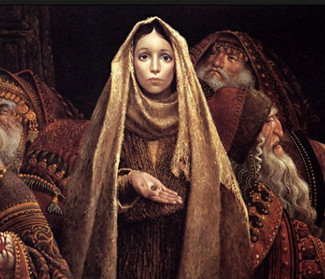Sacred Scripture has always revealed a people wrestling with a precarious uncertainty. Narratives all throughout show that one size does not fit all. We can be united in the same covenant or cleansed by the same waters of baptism and yet we can be radically different from our closest neighbor. Case in point is the story of the prophet Elijah’s request for water and bread from the widow of Zarephath. He sounds privileged and indifferent to her desperate situation. There had been a drought in the land and as a result she has only a bit of flour and some oil to prepare a final meal for herself and her son. But Elijah's response to the widow echoes God's response to those in need throughout the Bible, "Do not be afraid." Elijah is God's prophet and when he speaks he speaks for God, revealing, once again, that God notices and acts in favor of the needy and outcast.

Today’s scriptures single out two women who had much in common - their desperate need and God's awareness of their plight. Unlike the widow of Zarephath, we don't know what happened to the widow in today's gospel. Jesus points her out to his disciples and notes that she gave "from her poverty, had contributed all she had." But we never know if this particular person was later one of the victims of poverty who, in Jesus' time and our own, suffer and die in their want. Was she just one more of the anonymous poor of the world who pass on into obscurity and whose death is barely noticed?
The world of the Scripture stories is not so different from our own. We look at these women today and are reminded of how God came to the need of those in the past and how he continues to do so even now. God is concerned for our present hungers and we who are nurtured and fed by our God are called to turn our attention to those who can be simply overlooked or ignored. Elijah tells us to face our fears and to hope in God. Jesus teaches a new spirituality of giving through word and deed. We are to do as he did. We are to "observe" and tend to those who need our attention, who are not the notables of our world and who do not have the prestige and status that normally attracts the world's eye and favor.
It is important for us to understand the context of today’s readings. Just weeks before his death, Jesus has finally made his way to Jerusalem and is in the Temple preaching. Along the journey we have seen him teach the meaning of discipleship. We have witnessed the faith of a blind beggar and the lack of faith of a "rich" young man. We have heard the Lord say that loving God is inseparable from loving our neighbor. And we have watched as he explained that mere ritual and just “following the rules” is not enough – the external show of religion has now been supplanted by a gospel of grace. Using Elijah's story and the example of the widow in the temple, Jesus re-emphasizes his teaching and makes it concrete.
What does all of this have to do with us? We are called to imitate God’s hospitality and examine how generous we have been in offering ourselves to God’s service – especially to the least and overlooked, like the widow of Zarephath who placed her trust in a stranger and the barely-noticed widow of the Gospel who struggled day in and day out to survive in an imperfect world.
If we are going to participate faithfully and meaningfully in the world, we need to respond to the reality lived by the majority of earth’s inhabitants — one of poverty and exclusion.
This is our response to the graciousness of God who comes to the aid of the vulnerable. We have no need to fear because "The Lord keeps faith forever, secures justice for the oppressed." (Psalm 146)





